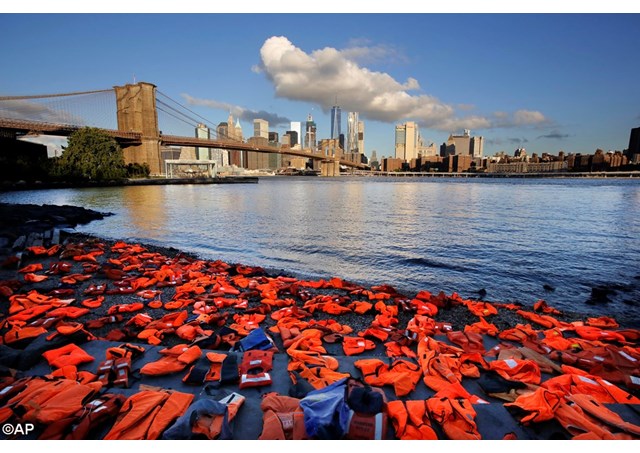
JRS on the lights and shadows of the UN Refugee Summit

(Vatican Radio) A Holy See delegation, led by the Cardinal Secretary of State Pietro Parolin, on Monday joined other world leaders in New York for a high level Summit hosted by the UN General Assembly to address issues related to large scale movements of refugees and migrants.
Faith-based organizations are holding a side event on the same subject to make sure questions regarding the human rights of refugees, internally displaced persons and migrants are not up for debate.
One of the faith-based organizations calling for a people-centered, human rights and dignity approach to internal and international migrants and refugees is the Jesuit Refugee Service.
Jesuit Father Michael Gallagher, JRS representative to the United Nations in Geneva told Linda Bordoni that while he welcomes the unprecedented summit and its outcome document which reiterates a series of fundamental commitments, there are important issues – such as the commitment not to detain migrant children - that have not been addressed.
Father Michael Gallagher who has been working with refugees since 1994 describes 2016 as “very, very disheartening.”
He speaks of how in February he personally witnessed the arrival of Syrian families in Greece as they made their way to the Macedonian border and then into Europe (before the closing of the borders) on a day in which 1500 people arrived from Lesbos.
“It was quite touching, but also saddening when you saw the response that came later on” he says.
As regards the UN Refugee Summit Gallagher does not entertain much hope for significant change in the short term.
“It’s a State-run process which is to say that in the UN – when it’s a State-run process – they work by consensus” which means, he says - that the actors involved will end up adopting the law’s common denominator.
And he says, with respect to the outcome document and to the refugee part of it, there is not anything that is new.
In fact he points out there are some things that are troubling: “for example that they did not make a clear commitment not to detain children who are migrants”.
Gallagher explains that with respect to refugees, the outcome document basically follows the refugee process of “identification, settling in, assessment of claims, and solutions for the people who are recognized as refugees - which is essentially the structure of the 1951 Refugee Convention”.
He says that although it repeats the pledge of not sending people back to a place where they will be persecuted, this doesn’t always translate into reality on the ground.
When asked whether new problems that have arisen following controversial new policies and agreements or the closure of borders will be tackled, Fr Gallagher says the outcome document remains at a level of generality, and the commitments are: “we will make serious efforts to….”
Gallagher says that one of the things that NGOs were pushing for during preparation for the Summit was for a commitment by UN member States to take 10% of the refugee population each year to resettle, and to divide that 10% among the some 193 such States in the world. Of course, he points out, they had to be the States where refugees could make a living – Europe, United States and Australia - but that did not come about.
He says however that it is important to look at the glass which is “half full” rather than “half empty” and is convinced that it is good that nothing was taken away from the document, that States reaffirmed their commitment to the ‘rule of law’, to the human rights of people who are on the move, that they reacted strongly against the xenophobic tendencies throughout the world. But, he reiterates: “it remains at the level of generalities”.
Father Gallagher talks about the difficulty people – nations – seem to have in welcoming “the foreigner” and of how Pope Francis’ repeated appeals to change that kind of mindset is reaching the ears – and the hearts – of so many, including high level politicians who may, one day become leaders who will hopefully be instrumental in changing unjust policies.
He also speaks of some of the concrete effects of the Pope’s call for solidarity and welcome and points to the project agreed upon by the Sant Egidio Community with some Governments – including the Italian one – to set up ”humanitarian corridors” to receive refugee families.
“That is a wonderful programme and should be a model for Europe; it should be a model for the whole world” he says.
Unfortunately, Father Gallagher concludes, at a Summit such as the one taking place in New York “what you will get are a lot of canned speeches – they never really talk to each other at a meeting like that (…) you speak about what is your government position, not what you like to see done”.
The hope of JRS, he says, “is that things won’t get worse, that maybe the talk may make some inroads in local populations so they will resist the quick call to xenophobia – blaming all domestic problems on people coming from Syria, or Iraq, or Afghanistan, or Somalia…”
“We are certain that it is important to keep talking and we hope that the Summit will be a step in continuing the process toward a more welcoming world for people who need to leave because they are running for their lives” he says.
| All the contents on this site are copyrighted ©. |


